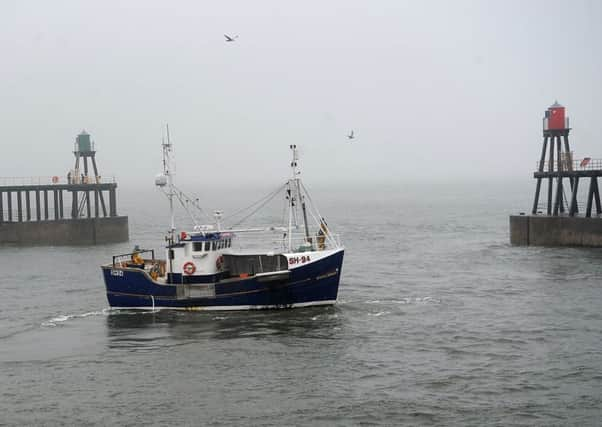Future of fisheries hinges on market access


Mike Cohen, chairman of the National Federation of Fishermen’s Organisations, warned of “very harmful” consequences for Yorkshire communities if the Government fails to strike the right deal with the EU for Britain’s future outside the trading bloc.
His alert comes as the influential House of Lords EU Committee published a new report today which warns that the UK fisheries industry is at real risk of being sidelined in Brexit negotiations.
Advertisement
Hide AdAdvertisement
Hide AdThe report highlights just how much the industry relies on continued access to EU markets, with 66 per cent of the UK catch exported to the EU in 2014.
But despite being the lifeline of many coastal communities, fisheries represent a relatively small proportion of the UK economy – less than 0.5 per cent of GDP.
Lord Teverson, chairman of the House of Lords EU Energy and the Environment Sub-Committee, said: “The UK fishing industry relies heavily on trade with the EU. Brexit will involve many trade-offs, and it may very well be that EU member states demand more access to UK waters than some fishers would want in return for our continued rights to sell fish to the European market with zero tariffs.
“What we are absolutely clear on is that the fishing industry and the coastal communities who rely on that industry should not be overlooked and must be fully consulted. While fisheries is a relatively small part of the UK economy, it is of fundamental importance to a great many people in different parts of the UK, from Brixham to Grimsby and Newlyn to the Shetlands. Those voices must be heard in the negotiations.”
Advertisement
Hide AdAdvertisement
Hide AdMr Cohen, who is also chief executive officer of the Holderness Fishing Industry Group, said the future of Yorkshire’s productive trade in shellfish - lobsters and crabs - relies on a good Brexit trade deal.
“The importance of fishing in fishing communities isn’t well represented as a proportion of GDP but it is in the number of working families it supports,” he said.
“Yorkshire’s coast has a really healthy industry at the moment. It has the largest shellfish fisheries in Europe, so just in the Bridlington area it means hundreds of jobs at sea and everyone on shore associated with that - from the people who repair boats, to others who make rope and fishing gear and drive the forklifts. One person working at sea provides several jobs on land.
“Parts of Holderness are also multiple areas of deprivation and the industry is providing jobs and income in areas that have these issues.”
Advertisement
Hide AdAdvertisement
Hide AdMr Cohen added: “For us on the Yorkshire coast, it is market access that is the crucial thing. We sell shellfish and more than 80 per cent is sold overseas, most of it into the EU. Continued access on good terms is absolutely crucial. Without that Brexit has the potential to be very harmful.”